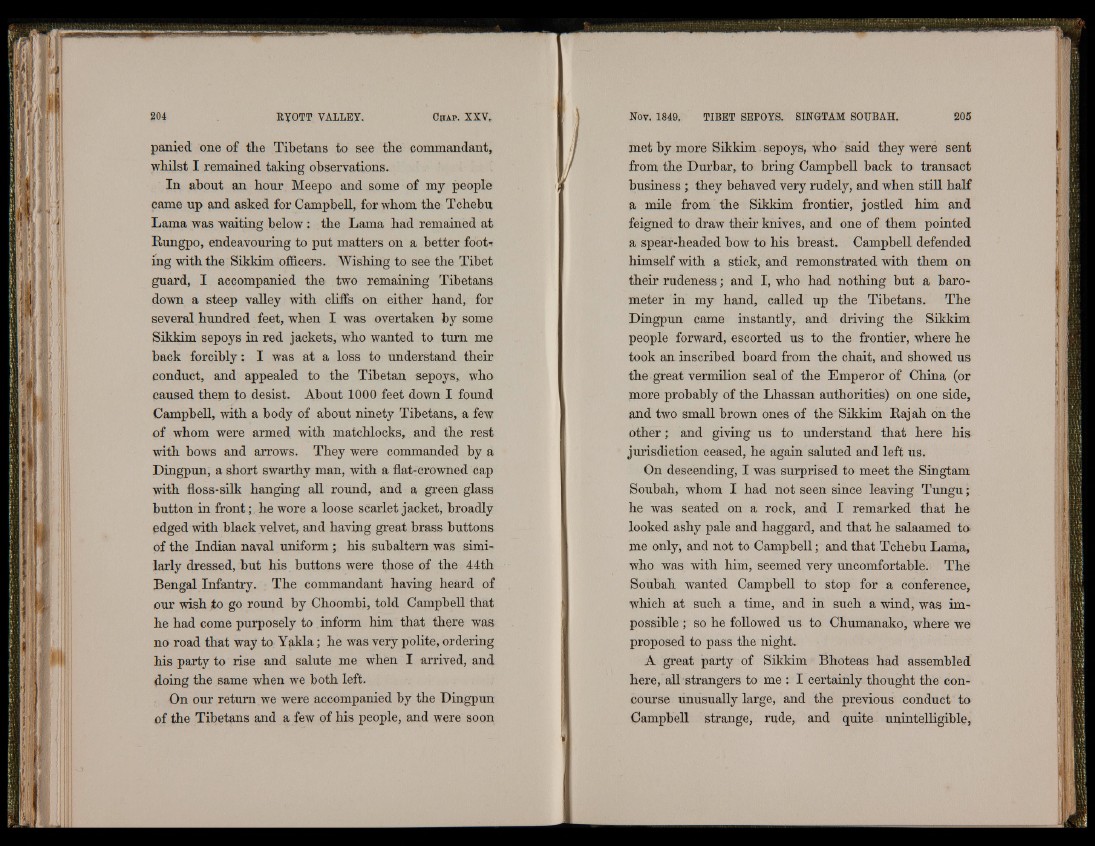
panied one of the Tibetans to see the commandant,
whilst I remained taking observations.
In about an hour Meepo and some of my people
came up and asked for Campbell, for whom the Tchebu
Lama was waiting below : the Lama had remained at
Rungpo, endeavouring to put matters on a better foot-«
ing with the Sikkim officers. Wishing to see the Tibet
guard, I accompanied the two remaining Tibetans
down a steep valley with cliffs on either hand, for
several hundred feet, when I was overtaken by some
Sikkim sepoys in red jackets, who wanted to turn me
back forcibly; I was at a loss to understand their
conduct, and appealed to the Tibetan sepoys, who
caused them to desist. About 1000 feet down I found
Campbell, with a body of about ninety Tibetans, a few
of whom were armed, with matchlocks, and the rest
with hows and arrows. They were commanded by a
Dingpun, a short swarthy man, with a flat-crowned cap
with floss-silk hanging all round, and a green glass
button in fro n t; he wore a loose scarlet jacket, broadly
edged with black velvet, and having great brass buttons
of the Indian naval uniform; his subaltern was similarly
dressed, but his buttons were those of the 44th
Bengal Infantry. The commandant having heard of
our wish to go round by Choombi, told Campbell that
he had come purposely to inform him that there was
no road that way to Yakla; he was very polite, ordering
his party to rise and salute me when I arrived, and
doing the same when we both left.
On our return we were accompanied by the Dingpun
of the Tibetans and a few of his people, and were soon
met by more Sikkim sepoys, who said they were sent
from the Durbar, to bring Campbell back to transact
business ; they behaved very rudely, and when still half
a mile from the Sikkim frontier, jostled him and
feigned to draw their knives, and one of them pointed
a spear-headed bow to his breast. Campbell defended
himself with a stick, and remonstrated with them on
their rudeness; and I, who had nothing but a barometer
in my hand, called up the Tibetans. The
Dingpun came instantly, and driving the Sikkim
people forward, escorted us to the frontier, where he
took an inscribed board from the chait, and showed us
the great vermilion seal of the Emperor of China (or
more probably of the Lhassan authorities) on one side,
and two small brown ones of the Sikkim Rajah on the
o th e r; and giving us to understand that here his
jurisdiction ceased, he again saluted and left us.
On descending, I was surprised to meet the Singtam
Soubah, whom I had not seen since leaving Tungu;
he was seated on a rock, and I remarked that he
looked ashy pale and haggard, and that he salaamed to
me only, and not to Campbell; and that Tchebu Lama,
who was with him, seemed very uncomfortable. The
Soubah wanted Campbell to stop for a conference,
which at such a time, and in such a wind, was impossible
; so he followed us to Chumanako, where we
proposed to pass the night.
A great party of Sikkim Bhoteas had assembled
here, all strangers to me : I certainly thought the concourse
unusually large, and the previous conduct to
Campbell strange, rude, and quite unintelligible,